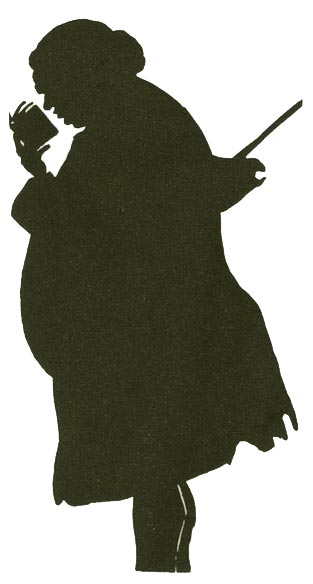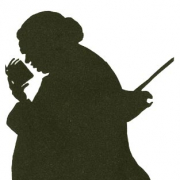MONTHLY BLOG 139, A YEAR OF GEORGIAN CELEBRATIONS – 7: ANNUAL DINNER IN HONOUR OF DR SAMUEL JOHNSON, GREAT LEXICOGRAPHER, MAN OF LETTERS, LITERARY CRITIC, AND WITTY/ PUGNACIOUS CONVERSATIONALIST
If citing, please kindly acknowledge copyright © Penelope J. Corfield (2022)

|
Silhouette of Samuel Johnson, |
It takes more than compiling a famous Dictionary to achieve the celebrity of Dr Samuel Johnson (1709-84).1 A huge, strapping, ungainly and constantly twitching figure of a man, he startled newcomers on first acquaintance. Yet he had a mesmerising personality, allied to great erudition and unforced eloquence.
Moreover, his contemporary fame was quickly turned into a long-lasting mythology, on the strength of not only his own writings but also a collection of admiring biographies. These included Thomas Tyers’ Biographical Sketch (1785); Hester Thrale’s Anecdotes of the Late Samuel Johnson (1786); John Hawkins’ Life of Samuel Johnson (1787); and Arthur Murphy’s Essay on the Life and Genius of Samuel Johnson (1792). They preserved vivid memories of the man himself and his conversational powers.
And, of course, the culmination of this sequence was the compendious Life of Johnson (1791) by James Boswell (1740-95).2 This account became a famous work in its own right. It was part literary biography, part Boswell’s account of the friendship between the pundit and his eager young friend-and-questioner. And when Boswell followed the Life with a shorter volume entitled Dr Johnson’s Table Talk (1798), Johnson’s reputation as a great conversationalist was sealed – complete with the consolidation of his moniker as ‘Dr Johnson’. That was not the preference of the man himself – but it successfully encapsulated his learned reputation for posterity.
Simultaneously, too, the joint names of ‘Johnson & Boswell’ became a classic formula for a great talker with his every word, caught by an eager young friend in tow. In reality, the two men were far from always together. Boswell was a young man of 22, just setting out on his legal career, when he first met Johnson, then aged 53 and already an established pundit. Thereafter, they socialised together and famously travelled together in 1773, when they visited the Scottish Highlands and the Hebrides. But they were not inseparable. And after his marriage in 1769 Boswell often spent parts of the year in Scotland.
What sort of conversationalist was the great man? He was both pugnacious and witty. Johnson enjoyed the company of lively debaters, whether men or women. Their smart questions and bold assertions were great triggers for his own conversational flights. He did not seek to deliver monologues. Thus, while he was notably combative, he did not drown out others or bore them by relentless talking. Boswell once referred to Johnson as ‘tossing’ and ‘goring’ his conversational opponents, like an angry bull disdaining the impertinence of pursuing matadors. Such bouts were somewhat theatrical, attracting crowds to enjoy the jousting. And indeed conversational gatherings, whether discussing politics, literature, science, farming, sex, or all of those, were very much a staple of eighteenth-century social life.3
Above all, Johnson was good at epigrammatic summaries: or eighteenth-century sound-bites. ‘Patriotism is the last refuge of the scoundrel’. So the observant Doctor dismissed politicians who yelp about their love of country to conceal their nefarious dealings. (Yes indeed). ‘When a man is tired of London, he is tired of life …’ (Yes again). ‘When a man knows he is to be hanged in a fortnight, it concentrates his mind wonderfully’. (No doubt). ‘Sir, a woman’s preaching is like a dog’s walking on his hind legs. It is not done well; but you are surprised to find it done at all’. (No! Boo! Shame!)
Well, there is the fun and stimulus of the renowned Dr Johnson. Enough to set one thinking and more than enough for grand arguments as well.
Today, fittingly, the Dr Johnson Society celebrates the life of this great ad hoc controversialist with an annual convivial Supper. It is held in the Guildhall in Lichfield, his birthplace, in September, on or near the anniversary of his birth. And it forms part of a weekend of imaginative celebrations in that city.4
Finally, too, other relevant talks, guided walks and festive events are organised at Dr Johnson’s House in Gough Square, in the City of London.5 This fine townhouse has survived wars and turmoil for over three hundred years. It’s well worth a visit from all interested in eminent Georgians – and in Samuel Johnson specifically. The man who wrote favourably on ‘The Art of Biography’ (The Rambler, 1750) would no doubt be tickled that later generations still enjoy his conversational ‘punch-power’ … But he would certainly find something about which to disagree: ‘Sir! when a man is tired of argument, …’.
ENDNOTES:
1 Among many works, see W.J. Bate, Samuel Johnson: A Biography (Berkeley, Ca., 1998); D. Nokes, Samuel Johnson: A Life (2009); and H. Kingsmill (ed.), Johnson without Boswell: A Contemporary Portrait of Samuel Johnson (2022).
2 P. Martin, The Life of James Boswell (1999); A.R. Brooks, James Boswell (2019); and D.J. Newman (ed.), Boswell and the Press: Essays on the Ephemeral Writing of James Boswell (Lewisburg, Pa., 2021).
3 See P. Clark, British Clubs and Societies, c.1580-1800: The Origins of an Associational World (Oxford, 2000); L. Damrosch, The Club: Johnson, Boswell and the Friends who Shaped An Age (New Haven, 2019).
4 For the Johnson Society (Lichfield), see https://johnsonnew.wordpress.com
5 See https://www.drjohnsonshouse.org
For further discussion, see Twitter
To read other discussion-points, please click here
To download Monthly Blog 139 please click here

